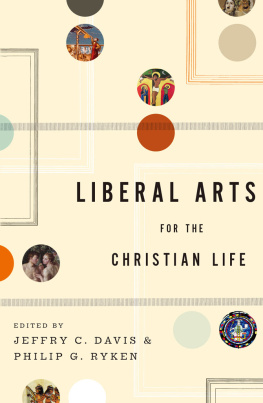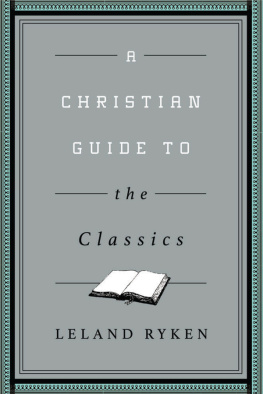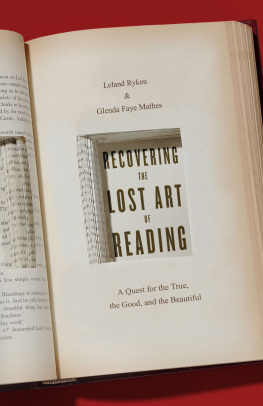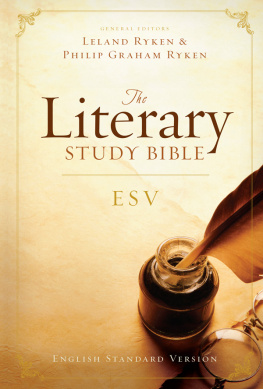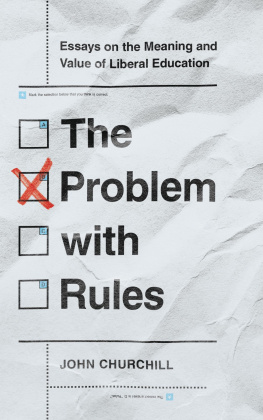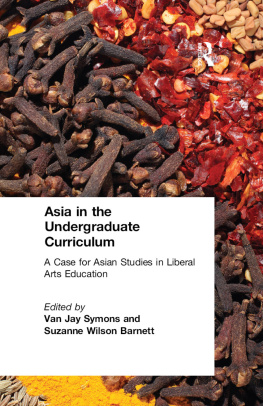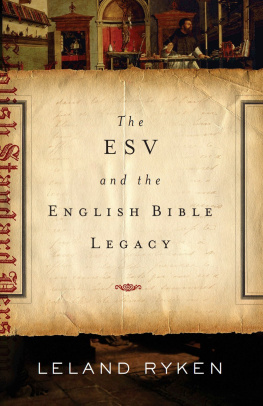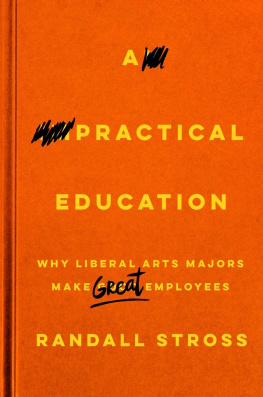Liberal Arts for the Christian Life
Copyright 2012 by Jeffry C. Davis and Philip G. Ryken
Published by Crossway
1300 Crescent Street
Wheaton, Illinois 60187
All rights reserved. No part of this publication may be reproduced, stored in a retrieval system, or transmitted in any form by any means, electronic, mechanical, photocopy, recording, or otherwise, without the prior permission of the publisher, except as provided for by USA copyright law.
The Students Calling copyright Leland Ryken. Used by permission.
The Toast of the University by Dorothy L. Sayers is used with permission of David Higham Associates, London, and copyright 1934, 2012 The Trustees of Anthony Fleming (deceased).
Cover design: Studio Gearbox
Cover image(s): See Cover Art Credits page
First printing 2012
Printed in the United States of America
Unless otherwise indicated, Scripture quotations are from the ESV Bible ( The Holy Bible, English Standard Version ), copyright 2001 by Crossway. Used by permission. All rights reserved.
Scripture quotations marked ISV are from The International Standard Version . Copyright 19962004 by The ISV Foundation. All rights reserved internationally.
Scripture quotations marked KJV are from the King James Version of the Bible.
Scripture quotations marked NASB are from The New American Standard Bible . Copyright The Lockman Foundation 1960, 1962, 1963, 1968, 1971, 1972, 1973, 1975, 1977, 1995. Used by permission.
Scripture quotations marked NKJV are from The New King James Version . Copyright 1982, Thomas Nelson, Inc. Used by permission.
Scripture references marked NIV are taken from The Holy Bible, New International Version, NIV. Copyright 1973, 1978, 1984, 2011 by Biblica, Inc. Used by permission. All rights reserved worldwide.
Scripture quotations marked NRSV are from The New Revised Standard Version . Copyright 1989 by the Division of Christian Education of the National Council of the Churches of Christ in the U.S.A. Published by Thomas Nelson, Inc. Used by permission of the National Council of the Churches of Christ in the U.S.A.
Scripture references marked PHILLIPS are from The New Testament in Modern English , translated by J. B. Phillips 1972 by J. B. Phillips. Published by Macmillan.
All emphases in Scripture quotations have been added by the authors.
Trade paperback ISBN: 978-1-4335-2394-6
PDF ISBN: 978-1-4335-2403-5
Mobipocket ISBN: 978-1-4335-2404-2
ePub ISBN: 978-1-4335-2405-9
Crossway is a publishing ministry of Good News Publishers.
TS 21 20 19 18 17 16 15 14 13 12
15 14 13 12 11 10 9 8 7 6 5 4 3 2 1
CONTENTS
Jeffry C. Davis
Lisa Richmond
Edith Blumhofer
Roger Lundin
Jeffrey P. Greenman
Wayne Martindale
Duane Litfin
Marjorie Lamp Mead
Alan Jacobs
Sharon Coolidge
Kenneth R. Chase
Jay Wood
Stephen B. Ivester
Dorothy F. Chappell
Henry Allen
Jill Pelez Baumgaertner
Michael Wilder
E. John Walford
Mark Lewis
Read Mercer Schuchardt
Peter Walters
James Wilhoit
John H. Augustine
Tamara Townsend
Philip G. Ryken
If you dont know where you are going, you will wind up somewhere else. So remarked the great American baseball player and amateur philosopher Yogi Berra, famous for his sage quips. It may seem like an oddly stated proverb, but his point has profundity: without a purposeful destination in mind, you may arrive at a place in life that you never wished to be. To put it another way, the path you follow leads to a particular location, whether you know it or not.
This truth holds special significance with regard to education. Paradoxically, without an end to educationwhat the ancient liberal arts teachers called a telos , which motivates your passions and directs your disciplined behaviortrue learning cannot really even begin. Without the intentional investment of your will, along with the imaginative consideration of where education might lead you, and the reasonable expectation of how it might change you, the forces of the dominant culturesubtle but powerfulwill surely take you where you may not intend to go, influencing your thoughts and actions. Your view of what a college education is for, and where it should lead, will shape how you think, learn, and actboth in and out of the classroomover the four years of your undergraduate experience.
Tragically, far too many graduates from high school enter college without much thought about the ultimate goal of their education. Three approaches to college seem all too common. Some apply to college simply because their friends are going and its the next thing to do on the checklist of life. Yet they may have never really asked themselves why it mattersor if it does matter. Likewise, others feel the strong influence of parents to study something marketable, getting a degree in a field that is practical in order to land a secure job. Yet they may never have really wondered what sort of education is best for all of life, apart from the forty-hour work week, and what kind of learning best prepares you for an ever-changing world. Even worse, many perceive college as a playground, a time to party and have fun that involves participation in all sorts of new experiences, many of which have little, if anything, to do with learning or living well. Yet despite all the tuition paid, the classes unattended, and the learning opportunities lost, they may never have truly considered the personal cost of such a wanton lifestyle, which passes for an education. In the final analysis, all three of these approaches prove to be deficient.
Sad though it may be, too many students enroll in college without even engaging their minds in connection to what really matters: they go through the motions without the meaning; they strive to pursue a dream that they themselves have not actually dreamed; they pursue destructive pleasures while ignoring purposeful passions. To put it bluntly, they are clueless in academe, though it is not entirely their fault. Far too many teachers fail to offer a compelling vision for learning that captures students imagination, one that elevates their human spirit. In the absence of such a vision for education, too many college students do what they do not by design but by default. And since they often do not know where they are going, in the words of Yogi Berra, they end up somewhere else.
Presenting a meaningful alternative, this guidebook offers some fresh perspectives for a new directionliberal arts learning from a biblical perspective. Especially intended for disciples (followers of a teacher and a school of thought) who believe that Jesus Christ has called them to Christian liberal arts study, such readers will be challenged with reasons for learning that are bigger and more consequential than the status quo or job security or fun and games. Because liberal arts learning is distinct from the pursuit of a specialized degree at a state university, or career training at a pre-professional school, or even preparation for the ministry at a Bible college, it requires a thoughtful orientation. This guidebook will provide just thata clear starting point and route toward a meaningful way of learning, one that has been traveled by thinking Christians for centuries.
The working premise of this collection of essays, all written by Christ followers who believe in the importance of purposeful living, is that you cannot truly experience a liberal arts education without a concerted effort to do learning differently. In its purest form, Christian liberal arts education requires the learner to affirm certain basic pursuits: growth, depth, and compassion. The development of the whole person for all of life, not just for a job; the deepening of faith in God through intellectual testing, not merely attaining answers; and the commitment to using knowledge and skill to build the church and serve the world, not simply to satisfy the self: these represent some of the core distinctives of Christian liberal arts learning.

